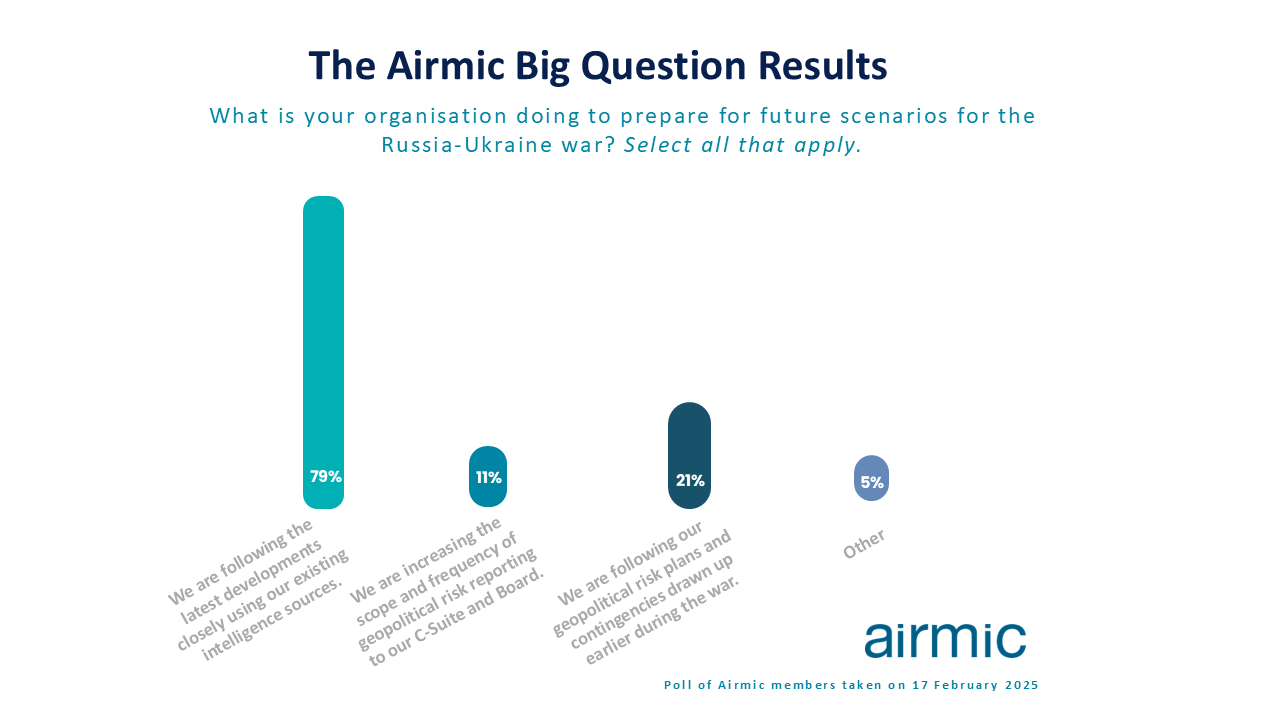RUSSIA-UKRAINE WAR
Fewer businesses adhering to initial geopolitical risk plans and contingencies.
Seventy-nine percent of respondents in this week’s Airmic Big Question survey said their organisations are closely following the latest developments in the Russia-Ukraine war, while fewer of their organisations are sticking to geopolitical risk plans and contingencies drawn up earlier during the war. This comes as top US envoys met in Saudi Arabia with Russia today to discuss a peace deal to end the war in Ukraine. This meeting was the first face-to-face discussions between the two countries since the war began and follows a hastily arranged summit in Paris yesterday of the “partners interested in peace and security” in the region, French President Emmanuel Macron’s office said in a statement on Sunday.

Julia Graham, CEO of Airmic, said: “This year’s Munich Security Conference has been a chilling wake-up call for Europe, as the US looks set to rewrite the rules of the transatlantic alliance. Businesses are monitoring and navigating the short-term risk outlook, while scenario planning for the longer view in the context of all this geopolitical volatility. In this situation, building resilience is imperative as businesses need to be prepared to deal with significant disruption caused by geopolitical risk.”
At the Munich Security Conference last week, analysts have observed how the post-World War Two security architecture for Europe has changed fundamentally, where Europe can no longer automatically rely on the US to come to its aid. Meanwhile, Ukraine and Europe were not invited to the US-Russia talks taking place in Saudi Arabia aimed at ending the war in Ukraine.
Hoe-Yeong Loke, Head of Research at Airmic, said: “The events in just the past few days have tested to the limits the UK government’s aim of bridging the gap between America and Europe, whether in terms of the global security architecture or trade. Risk professionals and their organisations need to be even more attuned to the interconnected nature of such geopolitical risks, given the implications for fiscal policy and the economy. Organisations have to be agile in responding to these interconnected risks while being in a permanent state of readiness.”
This week’s Airmic Big Question survey, just 21% of respondents said their organisations are following geopolitical risk plans and contingencies drawn up earlier during the war, and the third anniversary of the invasion of Ukraine on 24 February 2022 approaches.
Leigh-Anne Slade, Head of Media, Communications and Interest Groups, said: “Risk professionals are tearing up plans and contingencies drawn up earlier during the Russia-Ukraine war, in recognition of how fundamentally the dynamics have changed. Nevertheless, scenario planning and horizon scanning are the keys for risk professionals in preparing for geopolitical risk, while organisations must resist the temptation to be events-led.”
If you would like to request an interview and or have any further questions, please let me know.
We will be sharing the results of the Airmic Big Question with the press weekly.
You can also find the results here.
Media contact: Leigh Anne Slade
Head of Media, Communications and Interest Groups, Airmic
Leigh-Anne.Slade@Airmic.com
07956 41 78 77
